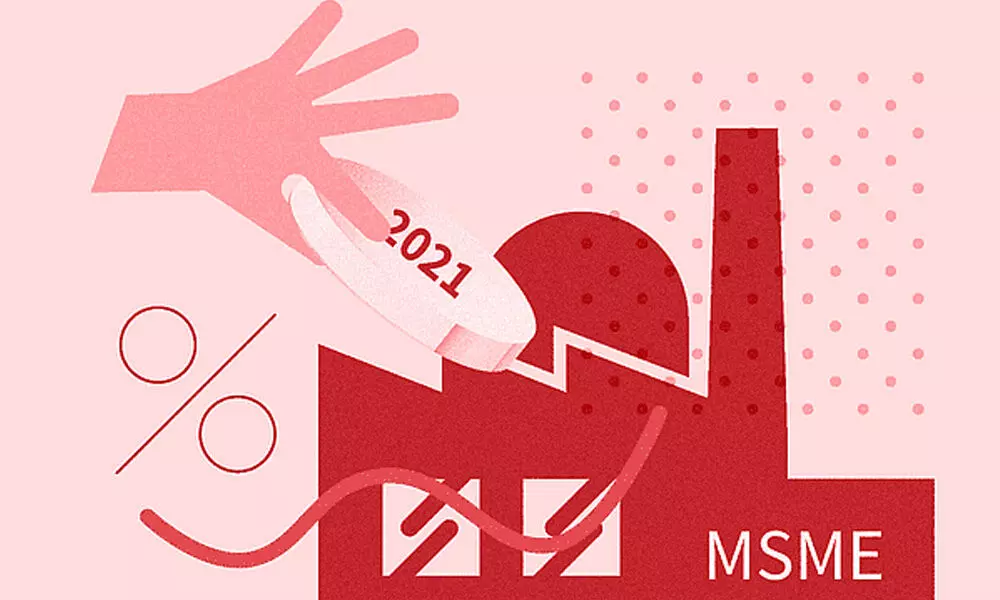MSMEs emerge more resilient in 2021: Khatabook

MSMEs emerge more resilient in 2021: Khatabook
India's fintech start-up, Khatabook, has released the ‘2021 Mid-year Covid Impact' analysis on the MSME segment in the country.
Bengaluru: India's fintech start-up, Khatabook, has released the '2021 Mid-year Covid Impact' analysis on the MSME segment in the country. With over 8 million monthly active MSMEs from almost every district of India managing more than 264 million customers on the platform, Khatabook represents the largest MSME network in the country. The platform has recorded transactions with a cumulative value of more than Rs 14 lakh crore to date. From an estimated 6.3 crore MSMEs in India, 1.5 crore MSMEs have recorded transactions on Khatabook in FY 20-21, representing 23% of the Indian MSME segment in FY 20-21.
These insights are based on the high-level cash flow and business activity analysis of the MSME ecosystem represented by the Khatabook app, assessing the overall impact on businesses during the phased lockdowns across the country by region and category. Unlike the nationwide lockdown in 2020, the lockdown remained phased and localized for the second wave of COVID-19 in 2021 across the country. As a result, the MSMEs across the country experienced an 11% average decline due to lockdowns in 2021 compared to 46% during the 2020 nationwide lockdown.
"The MSME ecosystem is more resilient in 2021. Phased lockdowns and MSME preparedness for external circumstances with digital adoption seem to have contributed to business strength. However, with lockdowns and restrictions being a constant reality in the pandemic world, cash flow management will be a defining factor for MSME business success moving forward.," said Ravish Naresh, Co-founder and CEO – Khatabook. "Also, the MSME segment is showcasing a definite learning curve with their usage behavior of digital platforms, indicating increased proficiency with digital solutions," he added.
Lockdowns and restrictions have a direct impact on MSME business activities. The lockdowns in 2021 are in line with the increasing COVID cases. Hence, there is a direct link between the number of cases increasing and the decline in business activity in 2021. The platform indicates the gradual decline in business activities from March 2021 and a sudden spike in the activities towards mid-June 2021 when the states started easing the lockdown restrictions. The Indian MSME segment is yet to achieve full recovery to the pre-COVID levels of March 2020.
Throughout the pandemic, the MSMEs across all the tiers have experienced more or less the same impact. However, tier 1 and 2 cities were relatively less impacted during the second wave as compared to metros, tier 3 and tier 4 cities.
Between January 2020 to June 2021, Delhi and UP, Haryana and Delhi and Andhra Pradesh and Telangana exchanged the highest interstate trade with each other. Individually, Delhi, UP and Maharashtra had the highest levels of ongoing interstate business activities.
MSME ecosystems in Jharkhand, Telangana, and Bihar were the least impacted states in the first half of this year while Uttarakhand, Kerala, and Madhya Pradesh were the most impacted. Madhya Pradesh, incidentally, was also one of the most impacted states last year.
Textile/apparel and footwear, automobiles, and traders continue to be the most sensitive categories to COVID lockdowns this year as well. While there is a growth in business recovery from 2020 to 2021 for these categories, they remain the MSME categories that will need close attention. Health, Grocery, Transportation, and Agriculture are the categories that continued growing in 2021 despite external circumstances.
The MSME business resiliency, in part, can be attributed to digitization. The trend of accelerated digital adoption from 2020 continues in 2021. However, what's unique this year is the way MSMEs are using digital platforms. The usage of in-app features per user has increased by 72% over the last year, indicating that MSMEs have started utilizing the full functionality of digital solutions. The steady increase in in-app feature utilization shows that small businesses are not just adopting digital but also becoming more proficient with the usage of digital.











